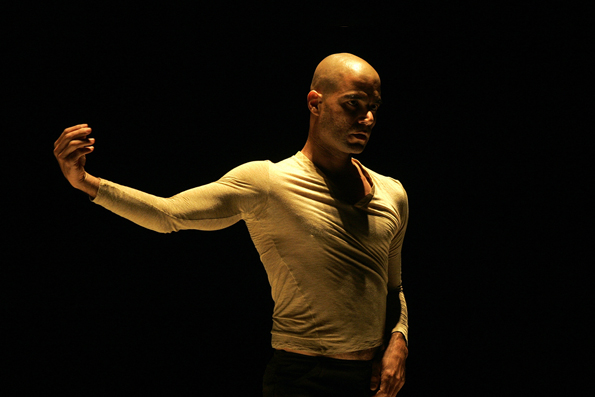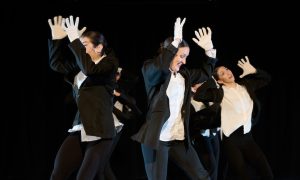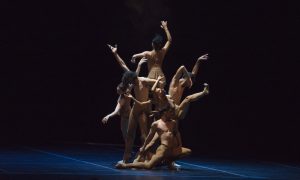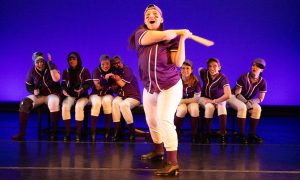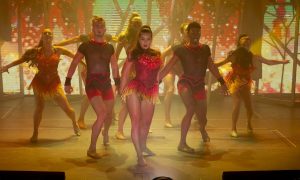By Dolce Fisher.
Emanuel Gat, acclaimed Israeli contemporary choreographer and Artistic Director of Emanuel Gat Dance, is creating groundbreaking works across Europe. Currently Gat is in Australia rehearsing with Sydney Dance Company developing a new work for the Company’s New Creations 2 season, due to premiere this month.
Emanuel’s work is noted for the formality of his deceptively intricate choreography and for a consistency of vision. Sydney Dance Company Artistic Director Rafael Bonachela describes Gat as “a master of purity, creating works imbued with incredible musicality. He is one of the most exciting choreographers in the world today, but his work has not been seen before in Sydney.”
Busy in the studio with the company, Gat shared a moment with me to talk about his career and choreography.
You started dance quite late – in your twenties. How did that affect your journey?
I went to a workshop for amateurs with two Israeli choreographers and after two months they asked me to work with the company. So as strange as it sounds, I basically started dancing professionally only a few months after I began dancing. Then I realised that this is something I really wanted to do. I am doing something that I love to do and I never feel like I’m working.
So you had no previous formal dance training?
In dance no, but I was very much into sports. So physically I was ready, in the context of contemporary dance. Of course, if I had chosen classical dance it would have been much harder. Contemporary dance allows more personal, let’s say ‘way of life’ [movement]. I also have a musical background.
So what was your inspiration for your new work with Sydney Dance Company?
My inspiration is always my encounter with the dancers, the moment I meet them, and the process. There is no inspiration before I get there. I don’t plan the subject or theme. Ideas, the process and the style of these people generate it all. It is really a process generated from the company/dancers I am working with.

Sydney Dance Company's New Creations 2
Did you get to spend time with the dancers before you began the choreography?
No, I was working mainly on the music, because I wrote the music for this work. So for the last six months it has been a parallel process of creating and constantly working in the studio, whether with my company or another commission. There is always a continuous process .It takes a new shape when you get into the studio with the dancers. I don’t make the choreography; rather create a context to work from with the dancers.
You have worked with many companies including your own, Sydney Dance Company and also the Paris Opera Ballet. How have the dancers influenced you in different ways?
The Paris Opera is a very unique example. It is so different from anything else I have done. The dancers and the company are different from what I usually work with. SCD, on the other side of the world, is very similar to my dancers at home. They have the same technique, context of references and approach to dance making, so really they speak the same language. But when you jump into a place like the PO it has its rules and goals and the dancers are trained in a very specific way. So for me, this specific experience was more interesting. I wanted to go to them and see what I could do there, rather than erase everything they do and make them contemporary dancers that they are not. So what was interesting to me was to work with them in their pointe shoes and to investigate that, because pointes are a specific tool. It is so natural to them. They walk in them like slippers (laughs).
Did they change your process to choreographing on the company?
No, the process is always the same whether I have contemporary, classical or hip-hop dancers. It still comes from the dancers, their abilities and their logic of movement. I don’t try to change them but take what they have to bring. It is not interesting for me to kind of break them, but rather use who they are and use this to create.
So you have worked with hip-hop dancers also?
Yes, there is a festival in France that actually does that. They get the most amazing hip-hop dancers and contemporary choreographers to work with them. It allows hip-hop to gain the respect that it deserves, because it doesn’t always get the same respect as other styles.
Emanuel Gat is in the process of creating a full length work titled ‘Brilliant Corners’ for 12 dancers at Emanuel Gat Dance, set to his own musical score. After the premiere work for Sydney Dance Company, Gat will return to France to continue work on this project.
Top photo: Emanuel Gat by BrunoPoinsard
Published by www.danceinforma.com


